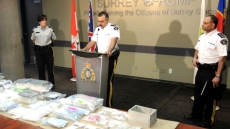OTTAWA — Federal revenue agency officials have handed senators detailed correspondence about six organizations whose charitable status was stripped over concerns about terrorist financing.
But the agency stresses that the fight against shady funding of political extremism begins with prevention — revocation being just one weapon in its arsenal.
The Senate defence and security committee has been pressing the revenue agency's charities directorate to provide the information since June of last year, but the federal election delayed the effort.
The pages cover the handful of cases since 2008 in which revocations involved concerns about terrorist financing.
Basic information about each case — including the World Assembly of Muslim Youth, the Canadian Foundation for Tamil Refugee Rehabilitation and the World Islamic Call Society — has already been made public.
But the various files — presented by directorate officials who testified before the committee — lay out details of the federal concerns.
The committee meeting Monday came amid growing concern about the surreptitious movement of large sums around the globe for illicit purposes.
The charities directorate says it turns down applications for charitable registration where terrorist financing risks arise.
The directorate also conducts audits of registered charities based on the risk and can take action ranging from education letters and compliance agreements to sanctions and revocation of charitable status.
In addition, it can also pass information about suspected criminal or security-related matters to police and intelligence partners.
Alastair Bland, director of the review and analysis division of the charities directorate, said there is a "recognized threat" against the Canadian charitable sector from people determined to support terrorism.
The audit materials provided to the committee should give senators a sense of the complexity of the revenue agency's work, said Cathy Hawara, director general of the charities directorate.
She cautioned that the Income Tax Act restricts officials to discussing only cases that end in revocation, meaning she had to be careful about referring to ongoing investigations.
"We continue to identify risks and we take the appropriate action," Hawara said.





